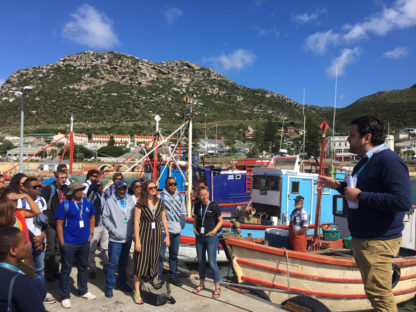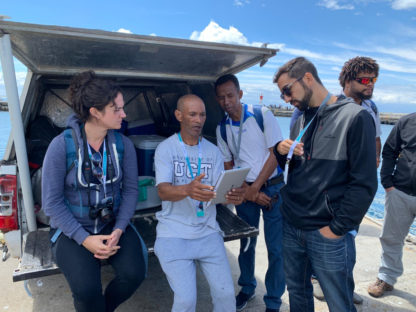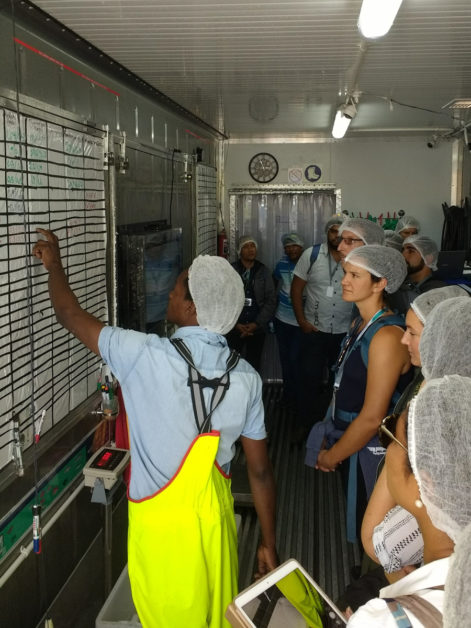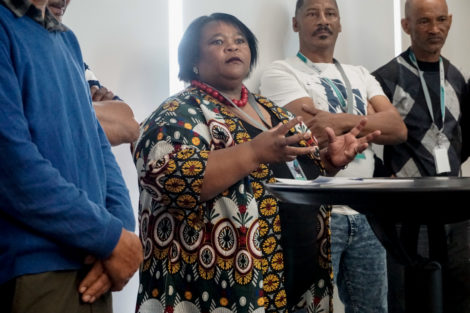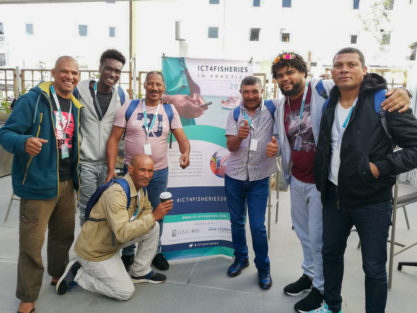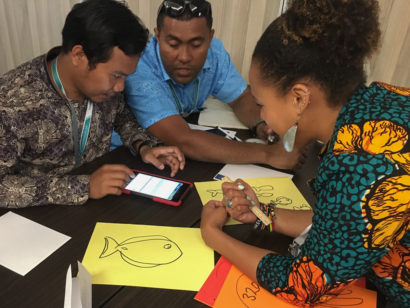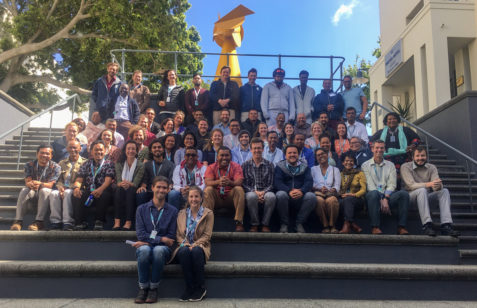Something really special happens when you get a bunch of passionate people in the same room together. Experiences are shared, ideas fly around and generally everything is very exciting. But making sure all voices are heard and that real plans are made can be a challenge. This was in the forefront of my mind as I looked across the group of passionate people gathered in a conference room in Cape Town.
Together with our partner organisation Abalobi, Blue Ventures hosted the second international ICT4Fisheries workshop earlier this year. Participants from more than 20 countries convened in Cape Town to share and learn from experiences in using technology in the context of small-scale fisheries. Tech such as smartphones, GPS systems, and new computer software has the power to transform the way small-scale fisheries are managed, how fishers operate and how markets function.
Abalobi kicked things off in a unique way by taking us all to the harbour, setting the precedent for this to be a different kind of workshop. Together, we followed the journey of fish from “hook to cook”, starting with fishers logging their daily catch on smartphones using Abalobi’s app. We then watched fish being packed into coolers at the most high tech shipping container I have ever seen. Finally, after sending these coolers on their way to be delivered to eager chefs at local restaurants, we were treated to a lunch of fish and chips where we used QR codes to “meet” the fisher that had caught our meal.
This experience highlighted several important points that formed the foundation of the discussions to come: small-scale fisheries provide crucial livelihoods for many people; technology can help collate valuable small-scale fisheries data; and technology can grant fishers access to new markets.
Discussion began in earnest on our return to the workshop, and I was thrilled to see the inclusion of voices that are not often heard in meeting rooms and conference halls. Many of the participants were from the front line of conservation, living and working alongside the communities that they were supporting to better manage their marine environment. This was particularly valuable in the discussions around gender inclusivity and supporting communities with low literacy.
More special still were the voices of the fishers in attendance, from South Africa and the Seychelles, who work with Abalobi. Their honesty about the realities of using tech kept our feet on the ground and centred the discussion around realistic and accessible solutions.
As the workshop progressed we heard from each organisation and explored how technology can be used to gather fisheries data in remote areas, track fish products through a processing facility, allow access to new markets, keep fishers safe at sea and much more.
To keep things fresh we facilitated break-out discussions, group exercises and networking opportunities, encouraging every participant to share their knowledge, absorb new ideas, and analyse the pros and cons of each tech solution they heard about. Finally, everyone got a chance to get hands on with the tech – to really feel how easy (or difficult) they were to use and to provide vital feedback to those developing them.
Building on previous experience using mobile phones to gather fisheries data, Blue Ventures and Abalobi are working to create a fish catch monitoring and data dissemination app that can be used by community-based data collectors in remote locations. The workshop participants provided a fresh set of eyes and weren’t afraid to point out the issues with our prototype. We are excited to take this on board, and are planning to start testing the app in the Comoros in the new year.
I am very grateful to the fishermen and women that took time out of their busy lives to share their stories and insights with us. At the end of the workshop, Hilda Adams, a fisher, business woman and Abalobi advocate, said to me “this meeting wasn’t a talkshop,” which was exactly the feedback I had hoped for. Instead of spending the week discussing hypotheticals and assumptions, the participants went away with concrete ideas and next steps for their work.
This meeting has successfully kickstarted a vibrant, active community of practice, and I hope that we all continue to learn and grow together as we work towards the same goal of securing the future for small-scale fisheries all over the world.
To find out more about ICT4Fisheries 2019 watch our summary video, read the conference report or visit the ICT4Fisheries website.
Special thanks to the Oak Foundation and WorldFish for generously supporting ICT4Fisheries.


